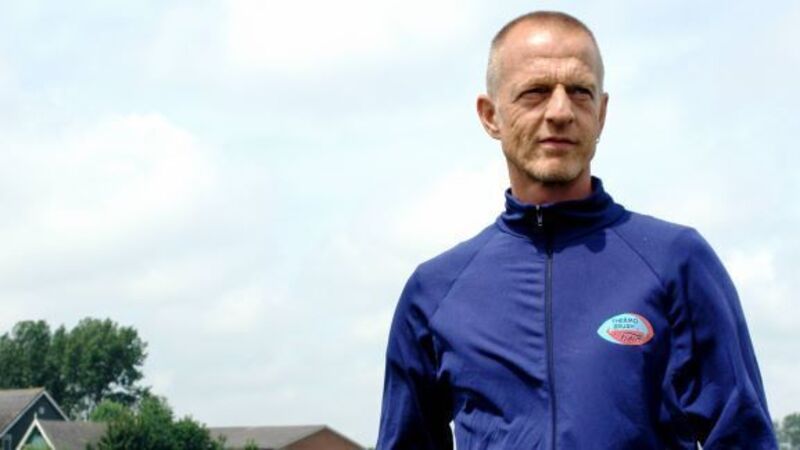Writing subtitles helped create a style purged of superfluous prose

He’s written two more since then, has sold worldwide, and in 2010, The Twin won the International IMPAC Dublin Literary Award. The Twin has been made into a movie, and his latest book The Detour has been signed up for one.
Talking on the phone from Amsterdam, Bakker is quietly spoken, modest, and clearly sensitive. He answers each question with apparent interest and courtesy. But this is no surprise. That sensitivity to humanity is evident in his writing. All this success, yet Bakker still feels surprised to have made it as a writer.
“The movie of The Twin was shown a month ago at the Berlin Film Festival. They’ve done a wonderful job. I’ve seen it twice,” he says. “I cycled home with the film version of the book last week. And I thought of all that has happened in just eight years. I’m amazed. And a bit bewildered.”
The Detour is about Emilie, a Dutch woman who is renting a remote farmhouse in Wales. She seems aimless, and is happiest by herself. She spends time at a stone circle, but she gets bitten by a badger, so has to engage with the locals. They think her an oddity.
It’s soon clear that she’s left her husband, having admitted an affair, but she remains an enigma. Meanwhile, in Amsterdam, her husband hires a private detective, and is soon to pay his estranged wife a visit.
But Emilie has drifted into a passionate friendship with a young man, who, first stays one night, but ends up lingering, and providing practical help, comfort and companionship. And gradually, Emilie’s secret is revealed. It’s written in stunning, yet bare prose, and is a mesmerisingly beautiful read.
Between 1995 and 2002, Bakker wrote subtitles for TV series. This taught him to condense text.
“I only had seven seconds and two lines of text so I had to leave out quite a bit, and I think that hones my writing. It gave me my style which is cleansed of metaphor and superfluous prose.
“The Detour, like The Twin, took me six months of concentrated writing,” he says. “I write for three hours in the morning, and work as a gardener in the afternoon. And I do all my editing at the same time. When the book is written it is written. So when I finish a manuscript there is little work left to do on it.”
Bakker writes a book in the same way that a reader reads it.
“I read back almost everything I’ve written up to that point, before I start writing. And the further you get into the book, the more you realise why you have written something on page three, which at the time you did not understand. I don’t think of it as inspiration. I always say it’s concentration.
“I always write straight onto the computer. The idea of writing with a pen and paper tires me out. God, the very thought of it! And I hate research. The thought of that makes me tired too.” Did he have to do much for The Detour? “No. I know North Wales well.
“When I am gardening, the book is in the back of my mind. It develops there. And the next morning it moves from the back of my mind to the front. Then I can write it down.”
“I’ve worked as a translator from English to Dutch, mostly on children’s books, but I could never translate my own books from Dutch,” he explains. “I’m pleased with David Comer’s work. The translation to English wasn’t easy for him.
“I played a lot with words and language, and, you could say that the whole book is written around one Emily Dickinson poem. Usually you let the translator do their job, and at the end you get questions. This book caused problems, so I worked on it with him a bit. We were emailing each other a lot.”
Writing, I suspect, makes him happy.
“It’s like you know me.” He pauses. “When I’m in those months of concentration, I’m the most happy person in the world. You are disconnected to everything, and at the same time extremely connected. It’s wonderful.”
The Detour came out in hardback, in England, last year. But it was published in Holland, in 2010. Bakker finished the manuscript in June that year. And he hasn’t written since.
“I’ve not written a word, but I’m fine. Maybe not very happy. No. I’m fine. I am happy.”
He’s recently bought himself a house in Germany, and he’s building himself a writing cabin.
“For the past three years, trying to write at home in Amsterdam, I haven’t been feeling like writing a novel, and you really should feel like writing one. Now I feel like feeling to write one.”
Winning all that money (€75,000, with another €25,000 going to his translator) from the IMPAC, must, surely have changed his life?
“I like having money in the bank, and I used part of it to buy the house,” he says. “But the best bit of winning the IMPAC was the four days I spent in Dublin.
“There was an interview, and a reading, and people came from everywhere in Ireland. And, really, they wanted to talk to me afterwards. That made me very happy. It was so nice. And I was thrilled to meet Colm Tóibín at the presentation. I loved The Master. I admire him so much. It was, Oh my God! Colm Tóibín. whoa!”
Was the IMPAC his greatest validation?
“What mattered to me most, more than anything else, is that The Twin came out in Denmark,” he says. “My publisher found my excitement at that very strange. She was ecstatic that it was to be translated into English, German and French, but I’ve always had a special relationship with Denmark. I like to go there, and a part of The Twin ends in Denmark.”











